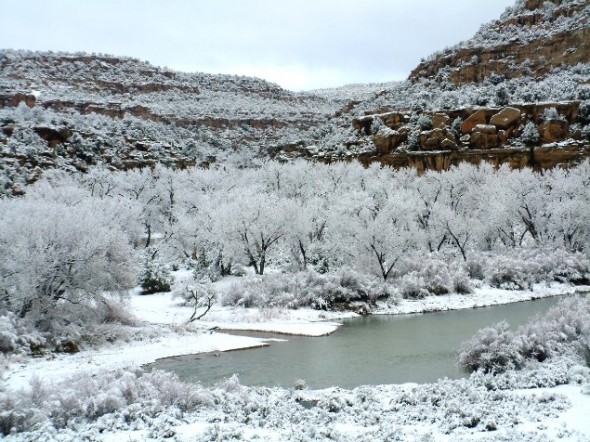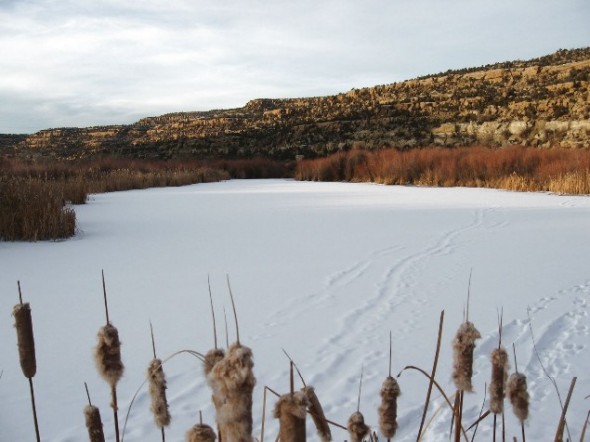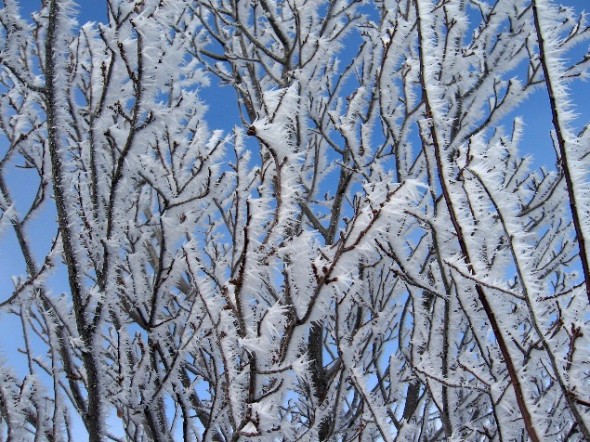Originally published in 2005 but much of the story and info still holds true.
There’s a reason savvy travelers love the off-season and the same goes for those who love to fish, especially on the fabled San Juan River in northwest New Mexico.
“I really like the winter fishing here because you don’t have the crowds and you can fish pretty much anywhere you want,” says Mark Wethington, the state Department of Game and Fish’s biologist stationed on the San Juan River at Navajo Dam. “And what’s so nice about New Mexico, you get a lot of really nice sunny days between November and March.”
I met up with Wethington during a winter fishing trip to the San Juan River back in 2005.
He was out counting beaver dams and I was chasing trout, we both had little or no competition on the river that day. And sure enough the day started out sunny and warm and the fishing was fine.
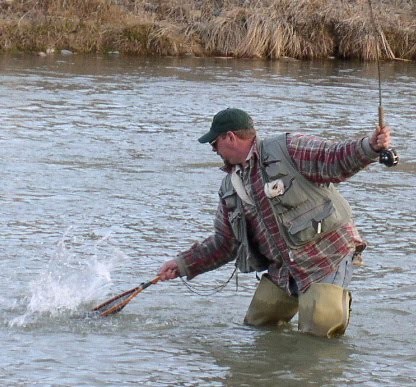
The author works at netting a trout while winter fishing on the San Juan River at Simon Canyon in 2005.Photo by Bill Diven of Media Placitas.
But as can be expected on the San Juan River in the winter the wind kicked up, the clouds rolled in and it turned cold, as did the fishing.
So we hiked back to the parking lot where the conversation turned to the much anticipated resumption of the annual spring release of irrigation water from Navajo Dam.
Years of unrelenting drought has severely reduced the amount of water typically sent downstream each spring and the river, the fish and the bugs they eat have suffered some because of it.
“We’ll get a big flush this year,” Wethington said. “And it’ll really benefit the river by pushing downstream a lot of the sediment that’s been deposited over the last four years. It’s needed and should really improve the aquatic life and fish habitat.”
The Bureau of Reclamation, which operates the dam, is expected in April to start increasing its release of water from the dam from a current level of 350 cubic feet per second to a high of five thousand cfs by May. It will be maintained for several weeks at that level until dropping again to 350 cfs.
The big flush, a man-made version of nature’s own spring runoff, will blow out the river and mark the beginning of the official fishing season on the San Juan river.
And the drift boat guides, the tackle shop owners, and the summertime anglers will be wringing their hands with glee as the flush is expected to stir things up good, including a lot of bottom-hugging lunkers.
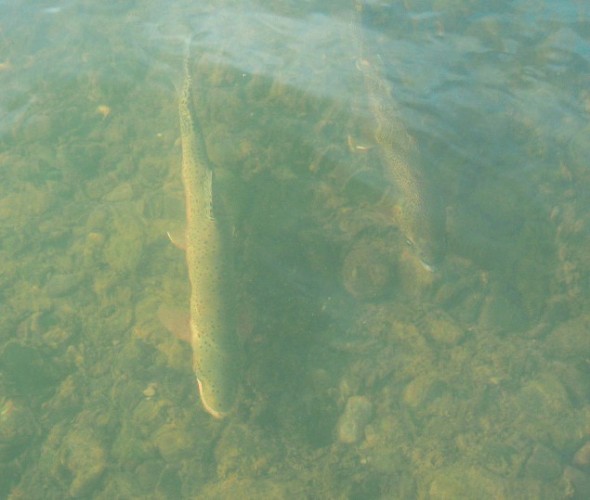
San Juan trout are fond of following anglers and picking off food stirred up off the bottom. Catching them while doing so is illegal.
But for me there’ll be no more long days of hiking and fishing the river without fear of heatstroke.
No more hanging out in the parking lot at the end of the day having a cold beer and realizing you don’t have any ice and really don’t need it.
It’ll be the end of no waiting for a table at the Sportsman’s and dinner served up hot, fast, and friendly.
And there’ll certainly be no more rolling into the campground at dusk and having my pick of the sites and finding a pile of leftover firewood as well.
Those are just some of the primary reasons for fishing the San Juan in the winter but there are others too.
Like just lying down at streamside and letting the winter sun warm your face while layers of wool, canvas, and rubber keep the cold and wind at bay.
Or letting the dog roam free without worrying someone might think she’s a stray and take her home when I’m not looking.
And then there’s the occasional thrill of a big brown trout snatching my drifting-egg pattern off the bottom and running clear upstream and across to the other bank in a big show of strength.
And one more thing, maybe the best, is watching a snow squall roll in.
As the water darkens the Baetis begin to hatch and the fish begin to rise. They come up slowly, sipping the fluttering bugs off the surface, and now I can tie on a dry fly.
It’s what fly fishing the San Juan River is all about. Big fish on small, dry flies smack dab in the middle of the winter.
It’s why you’ll see so many out of state plates in the parking lots.
I guess the only real problem I can think of with winter fishing on the San Juan River is there’s rarely anyone else around to witness your good luck.
Originally published in the Sandoval Signpost, April 2005.Republished with permission.
If you go winter fishing on the San Juan River:
Try to drive up in clear weather and don’t worry about it once you get there.
From Albuquerque take I-25 to 550 in Bernalillo and it’s about a two-hundred-mile trip through a lot of remote, rural, Indian country with the little town of Cuba providing a good, half way, rest stop. Save your appetite and stop at El Bruno’s for classic New Mexican fare at an old, family owned local restaurant that does it right.
Everything you need for a successful trip the San Juan River including fishing licenses, gear, equipment, food, and lodging can be had at Navajo Dam, that’s all they do there.
Just bring your checkbook.
Otherwise, take all the equipment and winter gear you’ve got and sort it all out once you get there.
You’ll probably want to bring a pair of neoprene waders because this water is cold. Breathable waders will work, just bring long johns and a pair of thick fleece pants to wear underneath. And don’t forget to bring a couple pairs of good thick wool socks for your feet.
Don’t skimp on clothing. It can be sunny and warm one minute and windy, cold, and wet the next. Dress in layers with lots of polar fleece or wool and top it all off with a good windbreaker/raincoat to ward off the wind.
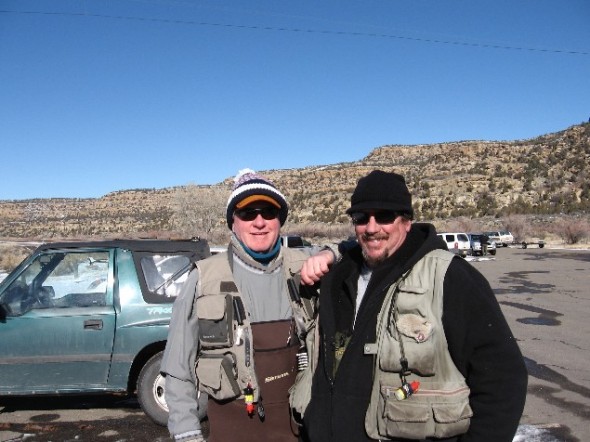
A couple of anglers suitably outfitted for winter fishing on the San Juan River in northwestern New Mexico.
A wool watch cap or fleece beanie will be useful for pulling down over your baseball cap.
Take a pair of fingerless gloves too. Just remember to push up your sleeves and remove your gloves before working with a wet,netted fish.
Wear a baseball cap and polarized sunglasses to ward off the sun, and most importantly, don’t fall in the water. If you do, quickly return to your vehicle and get out of those wet clothes fast. Pack an extra outfit for these occasions because if you don’t, you’ll need them.
To stay warm and keep your motor humming eat plenty of energy foods like trail bars, beef jerky, peanuts, candy cars, dried fruit, etc.
It’s also important to stay hydrated and because of the cold, you’ll have to force yourself to take in adequate amount of water.
A water purifier makes life on the river easier while a flask of whiskey makes it a lot more enjoyable.
One last thing, bring and use lip balm and skin lotion, the wind, sun and cold will result in cracked, painfull chapped lips and burnt skin that only shows up days later when it’s too late to prevent it.
Don’t be a fool, use the tool!
And don’t be afraid to camp out, it’s not as cold as you think, and once you’re inside a couple of sleeping bags, you’ll warm up fine.
I find a couple of hand warmers in the bottom of the bag help keep the foot area toasty. Bring your beanie to bed to keep your head and ears warm through the night and your fingerless gloves too, so you’ll be comfortable while reading.
Don’t forget that book and a reading light.
And guys, keep an empty water bottle inside the tent, it’ll save you the hassle of getting up in the middle of the night to take a piss. Just don’t mistake it in the morning for your other water bottle, the one you kept under your bags so it wouldn’t freeze.
And don’t forget a headlamp and extra batteries, it gets dark here early and bumbling around with a flashlight clamped between your teeth gets old real fast.
That’s why in the winter I shun a lot of cooking and opt instead for heating up a can of Campbell’s Chunky soup, Dinty Moore beef stew or a can of Hatch Brand green chile stew. Just don’t forget a box of crackers, you’ll want them for sure.
Pack hot cocoa, tea, instant coffee, non dairy creamer, sugar, a small cooking pot and a good sized coffee mug so you can have a hot drink in the morning to get you going.
I use a burner and stand that attaches to those one pound, propane canisters and it lights up quick, burns hot and lasts a long time. My wife turned me onto these and I haven’t used my white gas stove much since.
And lastly don’t pass up any loose firewood you come across, grab it because there’s nothing like a roaring campfire to warm those tired bones and lift the spirits as the sun drops behind the mesa and the day fade away.
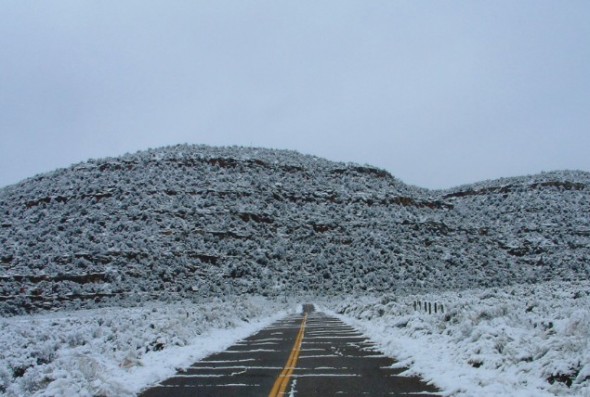
The road to the Simon Canyon day use area where snow squalls are known to bring on mayfly hatches in mid-winter.
On the way home make an adventure of it by taking the back way. It tacks about fifty miles on to the drive home to Albuquerque, but makes for a more scenic and memorable trip. Head up to and over Navajo Dam to US 64 for the trip home through Dulce, Chama, Abiquiu, Española and Santa Fe. Need I say more.
For a great meal stop in Española at the first light on the edge of town, Fairview Lane, and take a left towards the river. You’ll see Angelina’s restaurant just down the hill and on the right at the corner of Railroad Ave. The organic lamb chops here are to die for, as is any of the traditional New Mexican food offered by this longtime, fabled, family owned, eatery.
Originally published in the Sandoval Signpost, April 2005. www.sandovalsignpost.com Republished with permission.


